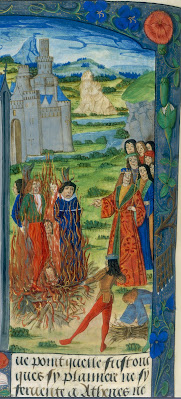That uncle, Fr. John Hinckaert, arranged for his nephew's education with the intent for him to join the priesthood. Join the priesthood he did, in 1317, at St. Gudule's. (His mother tracked him down in Brussels and joined a beguinage; she died shortly before his ordination.)
His uncle, and therefore by influence van Ruysbroeck himself, practiced an apostolic austerity that was becoming popular among lay people such as the Beguines. The groups that followed this lifestyle often developed their own tenets that clashed with the preferences of the Church. van Ruysbroeck wrote pamphlets against some of these "heresies," especially to counter the writings of a particular Brussels woman in the Brethren of the Free Spirit named Bloemardinne. van Ruysbroeck was not opposed to these groups and their desire to live a more simple and saintly life—he followed that urge himself—but he did not want those doing so to stray from orthodoxy.
His own desire for a less worldly life led him away from the Cathedral of St. Gudule. (Partly he seems repulsed by how his own writings against Bloemardinne kicked off a persecution of her.) He, his uncle, and his uncle's close friend, a fellow canon named Francis van Coudenberg, left the Cathedral to form a hermitage in 1343, in Groenendael. The Groenendael hermitage became very popular, and drew so many followers that the three had to organize it into a regular congregation, of which it became the motherhouse.
van Ruysbroeck did most of his writing during this period, including twelve books, all in Middle Dutch. One of them, The Twelve Beguines [link], discusses "different notions of the Love of Jesus" in a conversation between 12 Beguines. This book, so complimentary to the Beguines, as well as his reputation as a mystic, explains why he was at one time considered to be the author of A Mirror for Simple Souls, when its true author, Marguerite Porete, was temporarily unknown.
He passed away on 2 December 1381, leaving behind a massive reputation for holiness and wisdom. He was honored as a saint and his relics preserved, although they were lost during the French Revolution. He was beatified on 1 December 1908, although the pressure to have him canonized has abated. The illustration above is a common image for him: writing alone in the woods while caught up in mystical ecstasy.
And now for something completely different, to combat my own ignorance. While writing the opening sentence of this post, I found myself questioning the word "Flemish" and realizing that I did not have a firm grasp on its meaning. What does/did it mean to be Flemish? Does it refer to a language, a people, a place? I know very well there is no "Flemland." What did the Middle Ages consider to be Flemish? Let's find out together, tomorrow.


